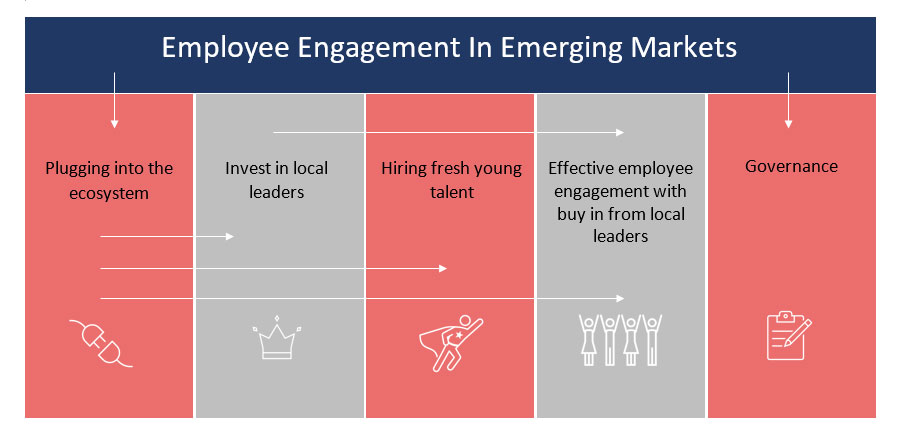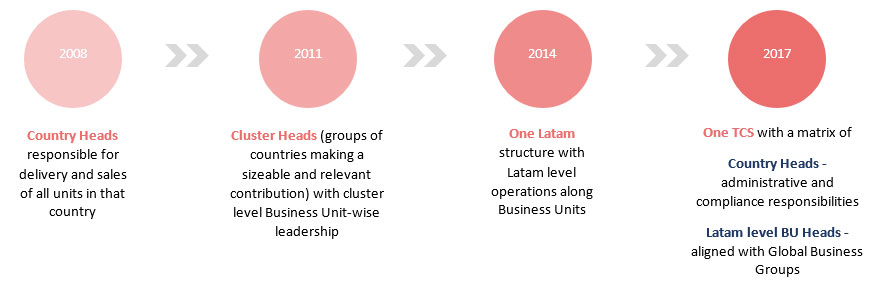Uniqueness of Employee Engagement IN EMERGING MARKETS
Emerging Markets in the context of TCS was a combination of 6 very different regions, each with a unique flavour in culture and employee engagement. The 6 regions were Latin America, Middle East & North Africa, Sub Saharan Africa, Mediterranean, Eastern Europe and Commonwealth of Independent States. The way in which these regions were differentiated from ‘Major Markets’ is that in relative terms, TCS’ presence in these countries was new and there were 2 primary types of businesses.
The Nearshore model (NA & Europe clients) – serving clients in Major Markets
The clients were used to TCS but were new to the Geographies. So it called for a 3 way engagement between onsite, offshore (India) and nearshore (Mexico, Uruguay, Hungary) teams. This needed the employees to be internally ‘competing’ with the efficiencies of the other 2.
Local Clients model – serving clients present in the same markets
Clients here were very used to being served by local small players who could rapidly scale up teams, paying little heed to the detailed processes that are needed in large scale global firms like TCS.
Case in point : Within Latin America itself, there were at least 9 nationalities with different cultural backgrounds.
The way TCS had grown was a combination of acquisitions (Chile & Brazil), and starting up a country operations from scratch (Peru).
Different local practices : Celebration of Quito day specific to Ecuador, Carnaval celebrated in a few countries or St. Valentine’s Day celebration rather than celebrating global holiday calendar. Even the dress code policy varied based on location. Colombia & Mexico had a more relaxed dress code policy compared to other countries.
Connection to larger organization needed a thorough understanding of the way the organization operated and developing an alignment to the overarching culture. As an example, TCS worldwide was heavily invested in ‘building talent’ rather than ‘buying talent’.
At the same time, prospective employees and clients needed to see the organization as a local company and NOT as an Indian company.
Quality Talent flow : The local talent perceived TCS as not in touch with market realities and was not an attractive ‘employer of choice’.
What was the engagement challenge OF THE GEOGRAPHY?
All the above models heavily relied on developing a sense of belongingness to the organization. However TCS had 2 big advantages in Major Markets and in India which did not exist in Emerging Markets. It was well known in the Indian market, doubly so as a part of the famous Tata Group. In Major Markets, ‘onsite’ opportunities for India based employees was a good motivator.
Many people at the headquarters did not realize that the flying time between Mexico and Chile was more than that between India and UK. Emerging markets delivery heavily relied on hiring locally in the markets and TCS was neither well known, nor was an attractive location for expats from headquarters.
Global perspective but localized personalization TO LOCATION, CULTURE, LANGUAGE, BUSINESS INTERSECTION
TCS Senior Leadership entrusted a new management team to look at these issues and work out a model which is contextual to the local realities but deeply aligned to the underlying values of the company. The team quickly put together an engagement model to address these.

- Talent brand building among university communities and talent market
- Establishing TCS as the IT front runners in the region
- Community Engagement (CSR)
- Digital Engagement (Codevita, Campus Commune)
- Physical Engagement (AIP)
Plugging into the Local Ecosystem
For sustained growth in the countries it was important to enable Engagement channeled towards ensuring quality talent flow.
Building Local Leadership
A new set of leaders who had spent more time within Emerging Markets were brought in to complement experienced Heads. For example, TCS trusted its Head of Delivery (Chile) to be the Country Manager for Peru and new operations were set up. Alongside, a part of the local Peru operations of an existing large client was taken over to be one of the first employee bases.
It was important to design the interplay between corporate and local operations and therefore the process took a multi-step approach.
It was important to retain autonomy at a local level but within the overall framework of the corporation.

Start-up Culture: Considering that LATAM unit was a fast growing kid amongst other geographies where the practices were comparatively more mature, this offered the opportunity to operate with flexibility of a start-up culture wrt. faster decision making, ability to conceptualize policies relevant to the country, faster reaction to the market trend changes etc.
For example, learning hours per associate increased to 0.6 learning days per associate (highest amongst all geographies outside India). Customized Leadership development programmes partnering with local universities were launched.
Building Local Talent
One of the first steps was to build a robust ‘Learning’ team and also focus on integrating with the principle of ‘Internal Job Postings’. Visits from the Global heads of Talent Development (TCS team responsible for learning) and Resource Management Group (responsible for people moving between ‘projects’) were arranged and a detailed integration plan was developed.
Making the location attractive to THE BEST GLOBAL TALENT
One of the strong points of a global organization is the talent expertise which can be brought to the geo at will. However, the misconceptions around Latin America with regards to safety, language constraint, not family-friendly were big obstacles in getting the right talent into the geography.
Video testimonials from existing expats/ local hires were taken to clarify some of the misgivings and attract best talent to the geography. Dynamic and young talent from headquarters, all eager to learn and make a difference, were onboarded to integrate and align with local Talent.
Hiring Refresh
A central theme in the TCS operating model was to hire fresh graduates and focus on an ‘Initial Learning Program’ to make them work ready. Trainee hiring increased from less than 10% to 33% highest amongst TCS presence geographies outside India. Academic Interface Program Leaders were identified and senior executives visited campuses to sign MoUs. Campus Commune, a platform to enage the future joiners with the company, was enabled and content pushed in Spanish and Portunguese.
It was a matter of great pride to have the largest number of sign-ups worldwide for Codevita, TCS’s annual hackathon event for fresh talent. When a team from Peru (the newest country setup) qualified as a finalist, the Ambassador of Peru to India was invited as chief guest for the event.
“TCS hired 56 young people and played a vital role by changing the life of their families. This has made a huge impact by bringing in an income of 1 million reais to one of the poorest cities in Brazil”
– Coordinator, FATEC, Centro Paula Souza, Carapicuiba, Brazil
CPS has 223 + technical schools and 73 universities, offering 300,000 + students technical and graduation courses (FATECs)
Resonance with Sustainability
The Tata Group philosophy of making sure that the community is the very purpose for an enterprise was realized through ENABLE, a program to train people from disadvantaged sections of society . Then the same people applied for open postions in the industry, with many of them joining other IT companies. The success can be encapsulated from the feedback mentioned on the left.
Developing Pride
Global recognition mechanisms like Service Commitment Awards and TCS Gems were brought in and local vendors were identified to ensure prompt delivery of the awards. Each such session was preceded by a townhall by the local leadership, fully committing to the organizational philosophy.
Policies had to be documented and communicated. Policies were created and Spanish/Portuguese versions of the policies were uploaded on the intranet for all employees’ easy consumption.
Social engagement events like Family Day were organized which proved to be a hit with all employees giving both expats and locals to integrate with the ethos of the company and provide a glimpse of the company values to their families.
Cultural sensitization and treating each country uniquely was a learning. Two countries might speak the same language but need to be handled differently.
Governance sensitivity
One of the most contentious topics related to employees is compensation and benefits. The prevailing practice was to have a ‘case to case’ approach on management of employee compensation relying heavily on short terms needs and individual negotiation which made it difficult to predict employee costs to be able to forecast business margins. A complete overhaul having 4 important parameters was started:

At the same time, a framework of proactive regulatory audits ensured that all stakeholders are well aware of the operating compliance framework.
All these steps resulted in a thriving Geography with balance of standardisation and adaptability, fully integrated into the overall business structure of the company. The key was to implement each step in an intentional order of intervention with a coordinated, prioritized approach of moving from country to cluster, cluster to region and region to One TCS.









